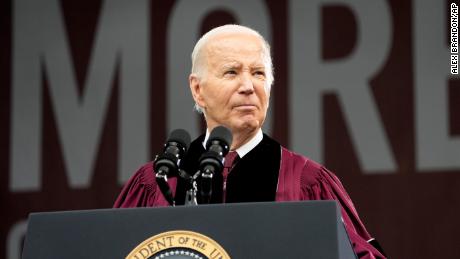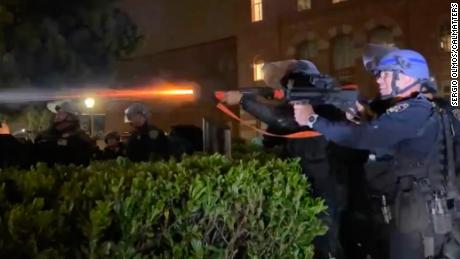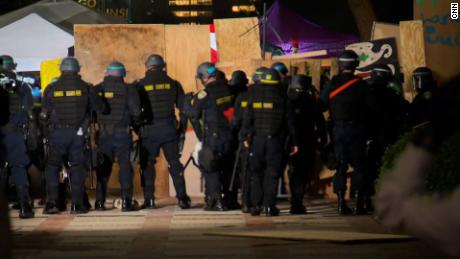Our country is in chaos. But it's a great time to be an American
Updated 2006 GMT (0406 HKT) July 4, 2020
(CNN)On July 9, 1776, a rowdy group of American colonists banded together at a political rally in New York City and did something that today would be called "badass."
They had just been treated to a public reading of the Declaration of Independence, which Congress had officially adopted less than a week earlier. After hearing calls to "dissolve the political bands" of tyranny, they marched to a public park that featured a statue of King George III, Britain's ruler, and knocked the 4,000-pound statue off its 15-foot pedestal.
The head of the statue was then decapitated and perched on top of a spike, and much of the rest was melted down to make 42,000 musket balls for American soldiers.
The historian Erika Doss thought of that scene recently while watching protesters toppling statues of Confederate heroes. Doss, who recounts the 1776 episode in her book, "Memorial Mania," sees a parallel between the colonists who fought against Great Britain and protesters who rail against Confederate monuments today.
"They're patriots," says Doss, an American studies professor at the University of Notre Dame, of today's protesters. "They're looking at the symbols and these visual and martial emblems and icons in their midst and they're saying this doesn't stand for who we are today."
It's easy to be cynical this Fourth of July weekend as the US celebrates its birth. The country seems like a mess. Racial protests have rocked every major city. Unemployment has soared. And Americans can't even agree if they should wear face masks in the middle of a pandemic.
But what some see as chaos, others see as an explosion of patriotism. They see it in the armies of Americans that took to the streets to protest racism. They see it in the companies that are taking unprecedented stands against racial and social injustice.
Even the Americans who are wearing masks for the health of their neighbors -- they, too, are reasons to wave the flag.
All of these different groups have declared their independence from symbols and ideas that they've decided no longer represent them, Doss and others say.
They are doing what their ancestors did in 1776, Doss says: "They are reimagining themselves and the nation."
America is bending toward justice
The evidence of this reimagining is reflected in the headlines.
Something has shifted in America when the Mississippi state flag, which bears the cross of the Confederate battle flag, is taken down while the popularity of the Black Lives Matter movement soars to an all-time high. Recent polls suggest that this year's BLM protests, which drew as many as 26 million people, were the largest movement in US history.
Read more from John Blake:
- Am I racist? You may not like the answer
- I covered the Rodney King riots. This moment feels different. That's why I'm afraid
- Coronavirus is bringing a plague of dangerous doomsday predictions
- Black America is being hammered by a double pandemic
- Native Americans were already decimated by a virus. They're scared it could happen again
- Her father was called 'the most dangerous racist in America.' She wants a different legacy for her son
- Trump is doing what Obama couldn't
Black Lives Matter has been described as everything from a hashtag to a "symbol of hate." But the movement has rarely been described as something else: one of the finest examples of patriotism in modern America.
The protesters who flooded the streets this spring to protest racism exemplify the revolutionary spirit of America just as much as the white colonists in powdered wigs, says Melanye Price, a professor at Prairie View A&M University in Texas who specializes in African-American politics.
"The people who are out yelling in the streets today are no different than Paul Revere yelling 'The British are coming!''' says Price. "It's the American way to voice criticism of the government and to rebel against oppressive forces."
In some ways, the protesters who took to the streets this year did a better job of honoring the words of the Declaration of Independence than the Founding Fathers, she says.
Many of our nation's founders were slave owners who treated Black Americans as tools for economic profit. When they said, "all men are created equal," that didn't include Black people, who were not considered fully human. They didn't consider women equal, either.
But Black people extracted concepts from the Declaration of Independence, like the right to protest, and "turned them into tools for American citizenship," Price says. "They took the words of the founders and rammed them up their damn throats."
We've expanded the definition of an American hero
It's easy to forget, but the person who became the catalyst the American Revolution was not a White man. He was half Black and half Native American. His name was Crispus Attucks, and he was killed during the 1770 Boston Massacre, an event that sparked the Revolutionary War.
The person who sparked the unprecedented wave of racial protests this year was also a Black man. George Floyd, who died while being arrested in May by Minneapolis police, is in some ways a modern-day Attucks, says Jerald Podair, a historian at Lawrence University in Wisconsin.
"Attucks died not knowing what his impact and significance would be, as did George Floyd," says Podair.
History textbooks tell us that American heroes are almost always White men carrying guns. A reader has to dig to learn about people like Sacagawea, the Native American woman whose language skills and bravery saved the vaunted Lewis & Clark expedition of the early 19th century.
This year's protests, though, have enlarged the definition of a what an American hero looks like. Some of the leaders and participants in Black Lives Matter protests are LGBTQ. The movement is multiracial and multiethnic.
And in some ways these protesters are just as tough as their colonial forebears.
The history books love to tell stories of the Minutemen, the elite band of Revolutionary War soldiers who were ready at a minute's notice to rush into battle. The Black Lives Matter protesters and others who recently took to the streets to demonstrate were not that different. They risked their lives, often on short notice via a text or social media alert, to demonstrate against racism in the middle of a pandemic.
Age made no difference. Many of those demonstrators were young -- some even too young to vote. They took rubber bullets to the face and swallowed tear gas. And then they came back the next day, like soldiers.
If you think that characterization is hyperbolic, listen to the words of another American hero who praised millennials -- people born between 1981 and 1996 -- in a recent speech. He said the country's youth make him optimistic about the future.
"They're not a lot like my generation -- in many ways, they are better," he said. "They care so much about their friends, they care about the issues, they question things in a way that I'm not sure we baby boomers questioned. They will take a stand on issues."
The speaker? Retired Adm. William McRaven, the Navy SEAL who oversaw the Osama bin Laden raid.
The coronavirus pandemic has also enlarged the definition of an American hero. We've learned that courage isn't just manifested in a SEAL team raid. It also can be summoned in mundane places like a health clinic, a grocery store or a meatpacking plant.
The pandemic has led many Americans to realize how dependent they are on these service workers, who risk their lives to keep the country running.
The colonists often invoked the term "liberty" to celebrate a form of rugged individualism where government and rules left them alone so they could live their version of freedom. So do many modern-day Americans. But democracy also depends on a sense of shared community, says Podair, the Lawrence University historian.
"Our life and health depends on the behavior of other people," he says. "We depend on our neighbor, sometimes to get us food or just to remain healthy -- and they on us. Because of the pandemic, America is a more democratic nation today than it was in February."
Our country is finally facing one of its original sins
The Black Lives Matter protesters may exceed the Founding Fathers in another way -- they're forcing the nation to face its racism.
When Thomas Jefferson drafted the Declaration of Independence, he added language that described the slave trade as a perverse plot by an evil English king to contaminate the colonies, Joseph J. Ellis recounts in "Founding Brothers," his Pulitzer Prize-winning book.
That passage, though was deleted by the Continental Congress in the final draft. The issue was so contentious and ingrained in colonial society that many founders thought abolishing slavery would kill the young nation in its infancy, Ellis wrote.
But a new generation of Americans are determined to do what the Founding Fathers refused to do.
Americans are devouring books on racism and corporate America is taking a stand against racial injustice. Ordinary people are talking about racism with a new depth that's remarkable, says Doss, the historian.
"It has been so interesting to see how words like white supremacy and imperialism are part of daily American vocabulary in ways now that were not a couple of years ago," she says.
This change didn't just happen. It took years of planning and activism.
"A multiracial fusion coalition has shifted public opinion in this country, and we've seen a tipping point in the past month," says the Rev. William Barber II, a 2018 MacArthur Foundation "genius" grant winner and president of Repairers of the Breach, a nonpartisan group that seeks to build a moral agenda around issues of poverty and racism.
"Many of us have been building this coalition for years, taking up the work of those who came before us," he says. "We never knew when the tipping point would come, but we are now in a moment where there is a public consensus that America must address the legacy of her original sin in systemic racism."
At the same time, there appears to be flagging interest in white grievance. It's not just Confederate monuments that are coming down. A core political tactic that relied on coded racist appeals may also be starting to topple.
In the 1960s the Republican Party quietly began its "Southern Strategy" of using terms like "forced busing" and "state's rights" to play on racial fears and win elections. Democrats have also used such appeals, but not to the extent Republicans have.
But racial dog whistles just don't hunt like they used to. President Trump is offering proof. He's opposing any effort by the US military to rename bases that bear the name of Confederate commanders. He also called Black Lives Matter a "symbol of hate."
And as of now he's losing badly to Democratic challenger Joe Biden in the polls.
"When we look back, we may well realize that there was indeed one last presidential election that could be won on white racial resentment ŌĆö but that election happened in 2016," Paul Waldman said in a recent Washington Post column.
Protesters in 2020, though, want more than an end to racist speech. Barber, for example, has helped launch a Poor People's Campaign and his group plans an array of activities around the Fourth of July this weekend.
"We can't get sidelined into little reforms around the edges," Barber says. "This isn't just about bringing down a flag or banning chokeholds. We are in a moment that demands a Third Reconstruction to guarantee freedom and equal justice. We must push to become the America that has never yet been."
That kind of America may seem far off right now. But we no longer have to look to the Founding Fathers to celebrate the spirit that makes this nation special.
We can look to the faces of the millions of Americans who took to the streets this year to reimagine the nation. We can look to the nurse who takes our temperature, or the other essential and brave workers who drive buses, deliver groceries and restock store shelves.
That's the paradox of this Fourth of July. It is an awful time to be an American. It is a great time to look forward to a New America.
All the people who took to the streets this spring are living monuments to a New America -- a land that never was, "and yet must be."



























